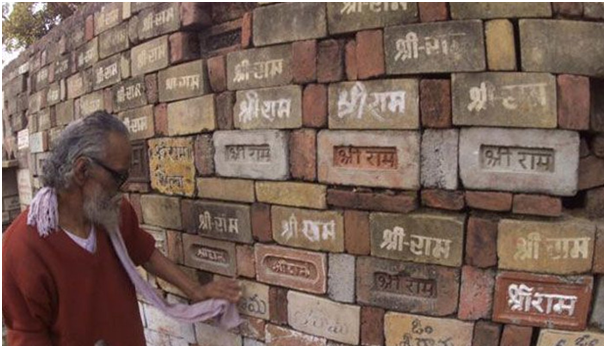Ram Mandir Back as BJP Poll Plank in UP

NEW DELHI: 2017 is a crucial year for the ruling party and the Opposition with the elections for Uttar Pradesh leading into the elections for the President of India, nomination of the new Vice President and hence a new Chairperson for the Rajya Sabha that will in itself reflect the complexion determined by the Assembly election results.
The battle for Uttar Pradesh has, thus, become the battle for the Rajya Sabha that is currently dominated by the Opposition that has, through largely united strategy, given considerable grief to the ruling BJP in Parliament in making it accountable for decisions and legislations for the past two years.
As the RSS mouthpiece, the Organizer wrote recently, “BJP president Amit Shah is eyeing more than 265 seats in these elections. A majority in UP means more seats in the Rajya Sabha where BJP is facing stiff challenge from the opposition benches.” This sentiment has been voiced at different levels by the BJP MPs who have felt the heat of Opposition in unity through the Parliament sessions. To the point where the government brought in the controversial Aadhar legislation as a money bill to ensure that it remained out of the jurisdiction of the Upper House.
The Assembly elections are thus, crucial for both the BJP to take over the Rajya Sabha before it goes into the Lok Sabha elections in 209, and for the Opposition to ensure that it remains in control. In the ongoing elections the BJP is not in play except in Assam, with the spoils being divided largely between the regional parties and to some extent the Congress as in Kerala and West Bengal.
Sources admitted that UP is seen as the turning point and Shah has pulled out all the steps to prepare for this election. He has placed a new state President in place a year before the polls, with the RSS clearly appreciative. As the Organiser stated, ““Selection of KP Maurya has sent good feelers within the BJP voters and supporters. He will attract votes of some non-Yadav castes of other backward castes (OBCs).” The candidates are being finalised, the issues being shortlisted ---law and order and development ostensibly---with Ram Mandir however, very much as a ‘top priority’ on the agenda. The stones for the ‘construction’ have already been delivered at the Ayodhya site, with further steps yet to be announced.
Union Minister for Micro, Small and Medium Enterprises Kalraj Mishra, an old UP hand, has now made it clear, "The issue of Ram Temple in Ayodhya has always been on the top priority and it will always be our top priority. We have a very clear policy in this regard. It depends on the court's order and forming consensus. It can be done by introducing a bill if the consensus is formed.”
BJP chief Keshav Prasad Maurya had earlier expressed confidence that his party would win an absolute majority in the 403-member House in the 2017 assembly elections and "establish Ram Rajya" in the state. But Mishra’s is perhaps, the first categorical statement about the Ram mandir in recent days.
The BJP is readying its first 200 candidates. The Samajwadi party and the Bahujan Samaj party have already announced their initial set of candidates. The Congress is working to announce its new party president, the choice vacillating between former Delhi Chief Minister Sheila Dixit and Amethi ‘raja’ Sanjay Singh. All political leaders admit that this will be a fight for the finish, and as one SP leader put it, “with no bottom line perhaps.”
UP has become crucial for the BJP for reasons more specific than just the control of the largest state of India. One, it will help determine the complexion of the Rajya Sabha, moving the scales decisively in favour of the BJP nearly two years before it goes into the general elections;
2. It will help get the BJP candidate in as the new President of India, as UP gives just over 400 votes per legislator to the electoral college formed for the presidential election. It is certain that Pranab Mukherjee is not being given a second term, with an informal search on for his replacement. Sources said that Prime Minister Narendra Modi was not averse to elevating Lok Sabha Speaker Sumitra Mahajan, although these are early days still.
3. It will give field leverage to the BJP in the Lok Sabha elections, as control over UP is a decided advantage always.
The election results for Assam, West Bengal, Kerala in May will flag off the campaign for Punjab and Uttar Pradesh. The BJP had won 71 of the 80 Lok Sabha seats in UP during the 2014 general elections.



